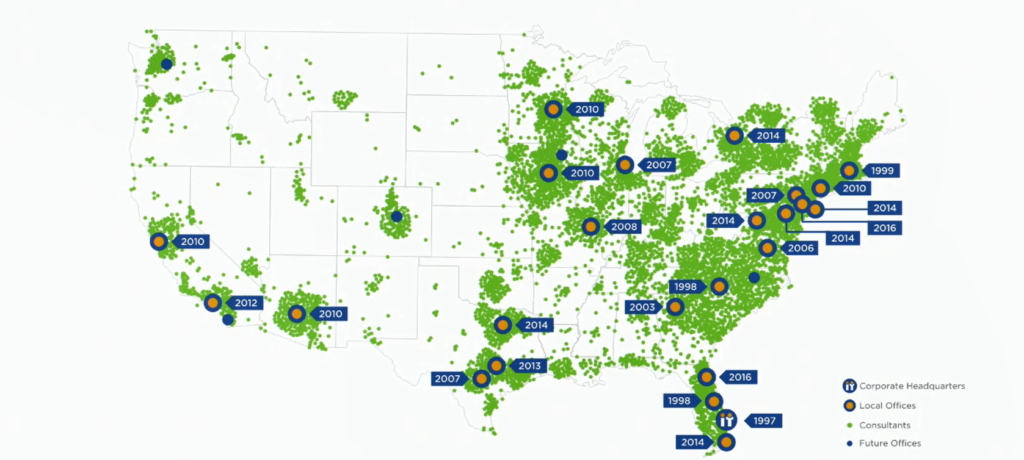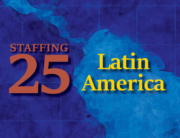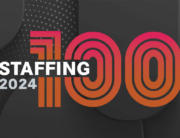In an ongoing series, Staffing Industry Review features excerpts from a 2019 Executive Forum session based on SIA President Barry Asin’s and Charted Path founder Mike Cleland’s book, Breaking Through: Leadership Disciplines from Top-Performing Staffing Firms, which captured the stories of staffing industry executives whose companies have reached the topmost 1% of US staffing fi rms. Three executives featured in the book participated in the forum presentation, including Jay Cohen, founder and CEO of Signature Consultants LLC. Here is his case study.
* This case study is based on the transcript of a session from the 2019 Staffing Industry Executive Forum. It has been edited for brevity and clarity.
Jay Cohen: When I started Signature Consultants in 1997, I was a gastroenterologist. On Wednesday afternoons, I would come to the office in scrubs to sign checks. And then on Friday mornings, I would have breakfast with the two guys that I started the company with — a salesperson who came from Technisource and a recruiter with one year of experience. Two months later, our third person came on board. That was how Signature began. And we are still all together.
When we started Signature, I knew nothing. I had never done business. I didn’t know staffing. But here’s the thing: You don’t have to know anything. You just have to be willing to ask every question.
The trajectory. From 1997 to 2008, we grew to nearly $150 million. Then we hit a cliff in 2008 — we had a very big dip. I will tell you right now, we were very fortunate. Ten years later, in 2018, we did about $370 million, with a $400 million run-rate for 2019. And our growth was all organic. We made no acquisitions along the way.
Footprint. In 1997, we had a practicing physician, the two initial people in Fort Lauderdale, and one sales guy in Charlotte. Now, 22 years later, we have offices in more than two dozen cities across the US, and a much wider consultant presence across the country. I talk about this for two reasons. One is because you can do this. I do believe that anyone here is capable of doing this. If you listen to the guys before me and you really think about it, this is very doable. The second thing, and I think this is ultimately the most important thing: Your eyes are probably drawn to the green and the blue (in the accompanying map) — where we are. Well, my eyes are drawn to the white. I see the blank spaces. I can’t help myself. I see that and I think, “How do I fill that in?” I like the game. I like to win and I like to grow. So, when I see that, that’s what I see. “How am I going to fill those white spaces?”
When Barry asked me here, I thought about what five things I would most want to say. I read the book again. I spoke to my team. I tried to break it down to concepts you can walk away with — things to help you build a framework of your approach to growth, based on what we have experienced through our years.
Contemplate. Think about the fact that, if you really want to grow, you have to embrace the notion of pain and fear. You’re going to have to have a plan to get through the reality that every day that you grow, you are going to wake up in uncharted terrain. So, you cannot fear change. You have to embrace pain and you have to embrace change and you have to be willing to live outside your comfort zone. And you have to accept those things. Because by definition, if you are growing, you are going to be where you weren’t before. So, well before you have any planning sessions or develop a corporate strategy, you have to think about where you are and where you want to go. Stop and think it through.
Hard work. If you and your people aren’t willing to work hard, you will not succeed. Period. End of story. It’s true in sports and it’s true in business. It’s the same in life. And you know what? Millennials are not only good, they’re great and they’re willing to work. They just have different motivators. But their reality is the same as everyone’s reality. If you’re not willing to work hard, you’re going to fail.
Desire. This is a critical component. This is the portal through which you have to walk, because if you don’t have the desire to do this, you’re not going to do it. I promise you. Breaking through will require sacrifices and risks. And it is desire that will drive you to make the necessary sacrifices and take the necessary risks.
If you don’t have the desire to succeed, you won’t. But if you really want to grow, then you’ll make those sacrifices and you’ll take those risks. That’s what we had to do in 2010, in order to get through the recession and the bankruptcy of one of our largest clients. We committed to opening in four cities at one time, with little money, when we had never opened more than one office in a year. Our desire and hard work got us through.
Culture. I look at culture from a biological standpoint. In medical school, we used culture media to identify different bacteria. Certain bacteria will grow on certain culture media but not on others. We would be given an unknown bacteria to lay out on agar plates. That would help us determine what kind of bacteria it was, whether it was gram-negative or gram-positive, and whether it was aerobic or anaerobic. It’s the same thing with culture and people. The culture that you instill in your companies will dictate which people can survive and thrive there. That’s why it is so critically important. You must have a vision for what your culture is going to be and what kind of people it will attract and hold.
People. All of the aforementioned concepts boil down to one thing — your people. If you make a commitment to building a group of motivated people you can count on, who understand the importance of hard work and culture, you will succeed. Everything that has been said today is about just that — the importance of your people. You could have all the money in the world, the greatest innovation, the greatest tools, you could have the greatest plan, but if you don’t have the people, you have nothing.
Every day I wake up in uncharted terrain. The only reason I sleep at night is because of my people. I think companies forget this all the time. You’re no better than the people you have around you.
It’s all about getting the right people and then keeping them together. And the bigger you get, the tougher that is. What holds people together is a shared story. Because what we are, the thing that binds us together, is who we are. Look at building your business as writing your story. And learn how to tell your story. If you look at it like that, every time you make a move that doesn’t work out the way you intended, you can reevaluate and decide what changes you can make to give the overall story the ending you want.
A defining moment. From day one, my goal was to make Signature the best place to work, not the biggest. And more importantly, I wanted it to be the best place for consultants to work. Early on, I received an urgent page while at the hospital. One of my guys was calling to tell me that he had pulled a working consultant off of a competitor’s job to take a job with us for another client — and that job had fallen through. We had zero consultants working. We were losing money — my life savings — at a rate we had never experienced before. I asked him what we should do, because I had no idea. I didn’t know the business.
When he responded, he started, “Well, if we were a body shop …” and I had to cut him off then, as a nurse and an anesthesiologist called me back to the exam room because my patient’s blood pressure was dropping. I told him, “I have to go. There’s an emergency. But ‘whatever a body shop would do?’ I don’t know what it is, but it doesn’t sound good to me. Don’t do that.”
I called my partner back when I finished my shift. I still didn’t know the business, but I knew what approach I wanted to take. I told him, “Ask yourself, ‘If you were that consultant, or you were that client, what would you want us to do?’ Whatever that is, do it. Whatever it costs, I’ll pay it. And if we can make a living doing that, we’ll stay in business, and if we can’t we’re out.”
That moment truly defined who we were going be. Signature would build a company based on doing the right thing.
Want to find out how your firm can break through? Visit www.staffingindustry.com/breaking-through








